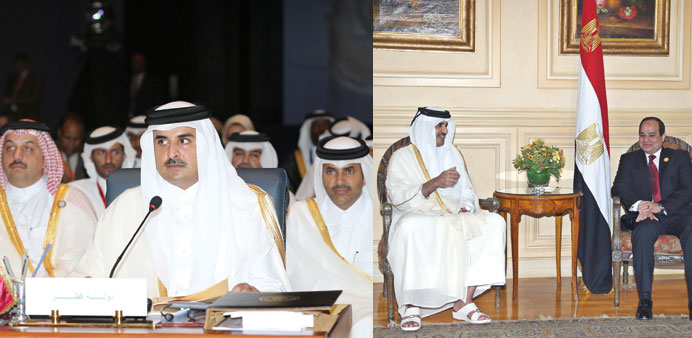HH the Emir Sheikh Tamim bin Hamad al-Thani attending the Arab League Council’s 26th summit in Sharm El Sheikh yesterday. Right: HH the Emir Sheikh Tamim bin Hamad al-Thani meeting with Egyptian President Abdel Fattah al-Sissi in Sharm El Sheikh yesterday.
Agencies
Sharm El Sheikh
Arab leaders met in Egypt yesterday for a summit overshadowed by the Saudi-led campaign against Yemeni rebels to discuss a joint-Arab military force to confront “terrorist groups”.
Yemeni President Abd-Rabbu Mansour Hadi hailed the intervention aimed at bringing him back to power, calling it a “practical application” of the kind of joint military action touted by Egypt’s leader.
Qatar blamed the Houthi militia and former president Ali Abdullah Saleh for the recent escalation in Yemen.
In a wide-ranging speech at the Arab League Council’s 26th summit, HH the Emir Sheikh Tamim bin Hamad al-Thani called on all parties and political forces “to give priority to the interests of Yemen and its people and respect the legitimacy vested in President Hadi and his globally-recognised government by withdrawing the militias form the state institutions and public places and work to complete the implementation of the political process”.
“In the sisterly Yemen, we consider that the outcome of the national dialogue, which was in accordance with the GCC initiative and under the auspices of the UN, provides a solid foundation for a new phase, on the basis of participation of all factions, in a fair and equitable manner,” the Emir said.
“But the recent events which were perpetrated by the Ansar Allah group (the Houthis) in collaboration with the former president are an assault on the peaceful transition process in Yemen.
“They nullify the results of the national dialogue of its content, confiscate the political legitimacy and breakdown the state institutions, and the most dangerous of all, they sow the seeds of a hateful phenomenon in Yemen: political sectarianism.”
He said: “The Ansar Allah militia movement and former president Ali Abdullah Saleh are responsible for the recent escalation.
“Strenuous efforts have been made to invite the aggressors to join the peaceful transition process for dialogue in Riyadh, but the Houthis have refused, and the former president has tried to put forward preconditions.”
He said: “We must all stand beside the legitimacy in Yemen and reject the policy of imposing fait accompli in order to maintain the unity, security and stability of Yemen. The State of Qatar will spare no effort to realise that in co-operation with the brothers.”
The Emir, in his address, accused the regime of President Bashar al-Assad of conducting an “operation of genocide and displacement” against his people.
“We have to make it clear in a firm and categorical way that this regime is not part of any solution,” he said. “When will we, the Arabs, move to end this tragedy?”
Egyptian President Abdel Fattah al-Sisi told the meeting, held in the Red Sea resort of Sharm El Sheikh that the region faced an “unprecedented” threat, with unspecified powers and militants posing a danger to “its existence”.
Foreign ministers meeting before the summit proper had already approved a proposal to establish a rapid response military force, which the leaders were set to adopt.
They “agreed on an important principle, to establish the force”, Arab League secretary general Nabil al-Arabi told a news conference.
“This is the first time that a force will be created and work under the name of Arab states,” he said, calling the move historic.
However, Iraqi Foreign Minister Ibrahim al-Jaafari said yesterday that despite Baghdad favouring the overall concept of such a force, his country still had reservations.
The Arab leaders continued their deliberations later yesterday behind closed doors.
Meanwhile, UN Secretary General Ban Ki-moon has urged the Arab leaders to find a peaceful resolution in Yemen.
“It is my fervent hope that at this Arab League summit, leaders will lay down clear guidelines to peacefully resolve the crisis in Yemen,” he said.
The Israeli-Palestinian peace process, as in every Arab summit, also dominated the agenda, with the IS penetration of Iraq, Syria and Libya another high priority. Pages 2, 11, 26

